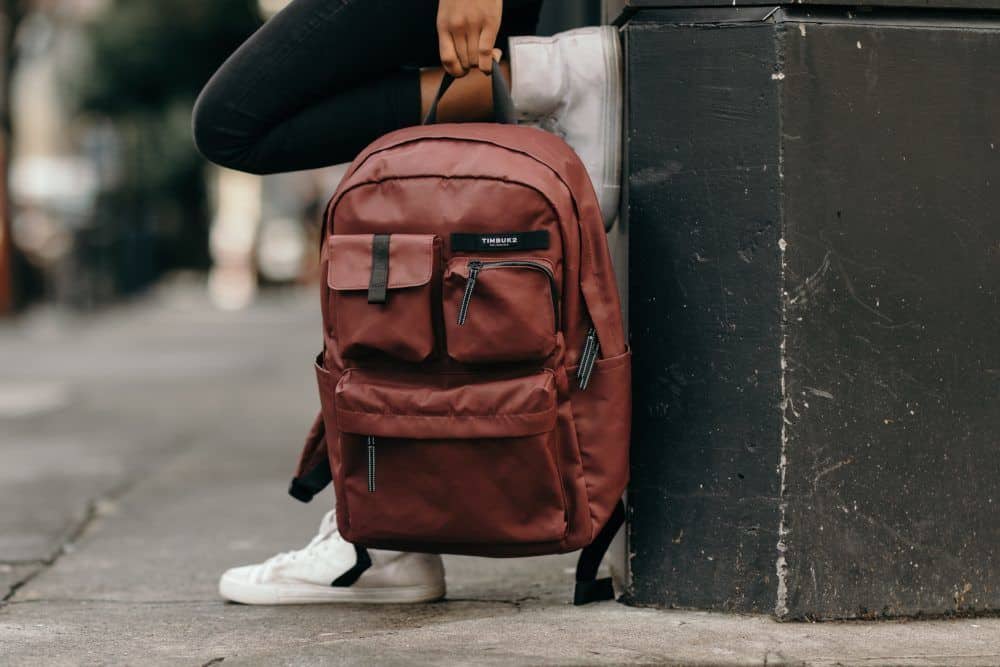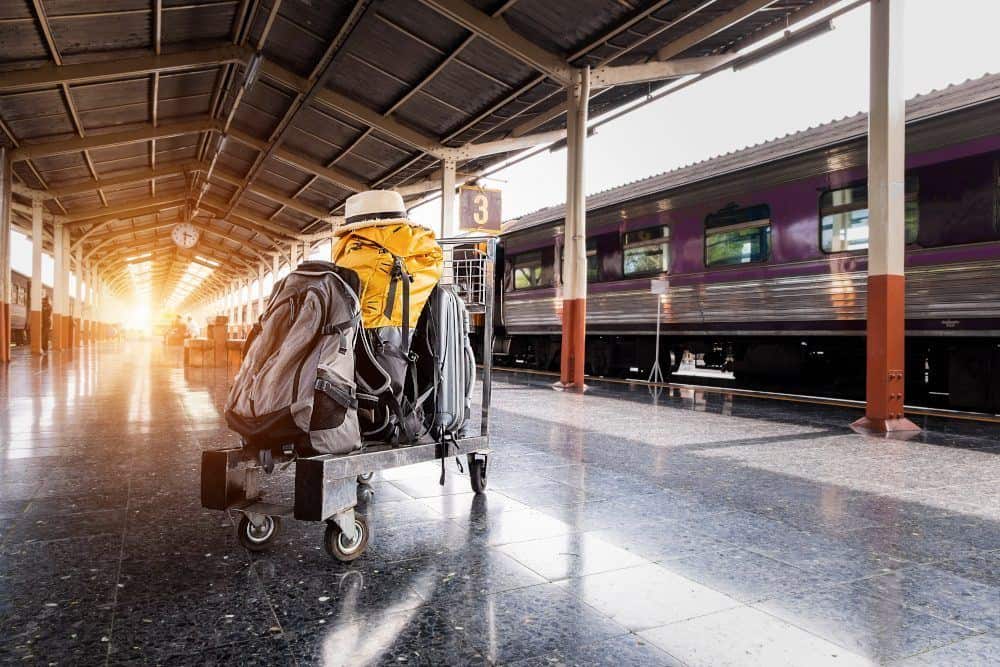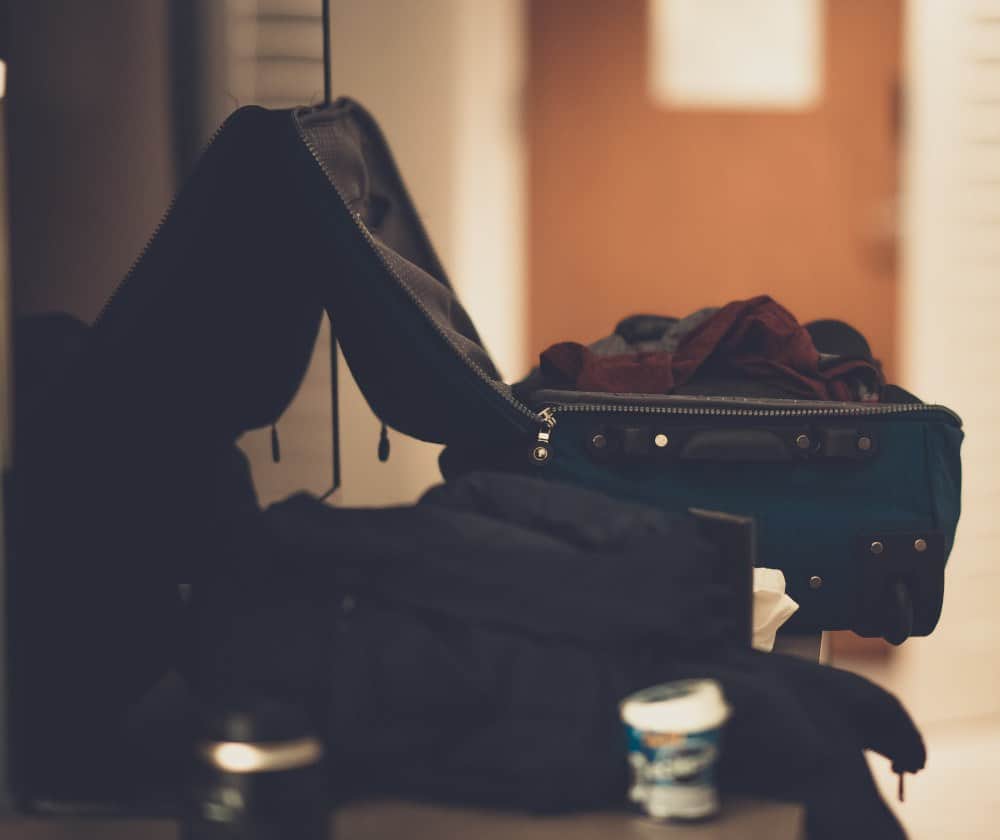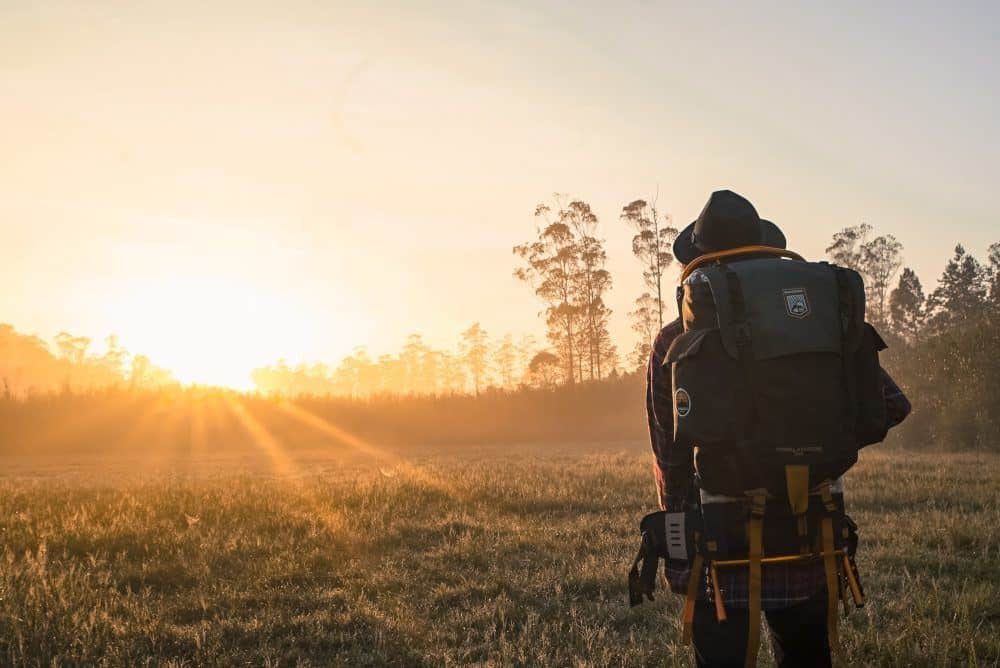An often asked question among backpackers and hikers alike is "how much should my backpack weigh?" When you set out to determine the weight of a backpack, it is very difficult to gauge how much exactly should be the weight of a backpack, because it varies from person to person. To new hikers, the first advice given is to keep their backpacks as lightweight as possible, and it is good advice. This is because the lighter the backpack, the more distance he or she will cover, with less strain on their backs.

This makes sense since if you are just starting out as a backpacker, it would be the least ideal thing for you to stuff your backpack with everything you got in your enthusiasm and head for the Appalachians and then wonder “how much should my backpack weigh?”
Table of Contents
How Much Should a Backpack Weigh for Backpacking?
If you have searched for the answer online, you may have come across varied answers. Some guides will tell you that the backpack should not weigh more than 40% of your body weight, while some other guides quote this number at 50% or even 30%. But the truth is that you should ask yourself how much weight can you comfortably carry? And no, you cannot come up with this number by magic.

The simplest way to figure this out is to backpack with the gear you think you would need, weigh it, put it on your back and take a short walk or even a hike to see if you can carry it comfortably. You shall soon arrive at a comfortable number. It could also be that you possibly have not been using the right type of backpack.
But if you must know, and must go by the book, then we should tell you that if you are going on a hike, your hiking backpack weight should not be more than 20% of your body weight. For example, if you weigh around 120 pounds, your backpack weight should be around 24 pounds or so. Also, if you plan to walk with your backpack, it should not weigh more than 10% of your body weight. So if you are 120 pounds, your backpack weight should not ideally exceed 12 pounds.
But remember that these rules do not necessarily work in all conditions. If you are a lightweight person and traveling alone, chances are that your backpack weight will exceed that figure of 20%, since you cannot possibly discard a lot of items because it is only you who has to lug that weight around. There could also be a number of factors that come in to play which we will look at now:
By now, you should be beginning to realize, "oh, so this is how much should my backpack weigh" and are beginning to see the advantages of carrying a backpack that does not burden you. You are probably already making a mental list of what are the items you may want to leave behind, but remember not to miss out on extremely essential items such as a medical kit, a knife or a multi-tool kit, something to make fire with and other such gear.
So in this next section, we will consider how we can reduce the weight of the backpack.
Reducing Your Backpack Weight
Remember, do not pack so light that you have to depend upon your fellow travelers for certain essentials. If you have a prior agreement with them, it is fine, but most regular travelers do not like sharing certain items, and you will do well to remember that.

What Is Your Base Weight?
You may have come across the term “base weight” if you follow travel blogs. But what exactly does it mean? Base weight simply means how much does your backpack weight without putting in the expendables or consumables such as water, food or fuel. This is because the amount of these would increase or decrease, depending upon the number of days of your trip.
The rest of the stuff, however, is unlikely to change much, and these include clothing, cooking gear, sleeping bags or tents and so on (unless these have been damaged during the trip and need to be replaced). So knowing your base weight helps immensely when you are starting to pack for your trip.
A lot of backpackers take pride in their backpack’s base weight. "Ultralight" packers usually have 10 pounds or fewer packed, lightweight packers have 20 pounds or fewer. But for most backpackers, this figure hovers around 30 pounds.
Weigh everything — as an addendum to this step, you could weigh every item in your backpack. This includes all your clothing, camping, and other gear. It is a good idea to note the weight of each item somewhere (preferably where it is handy), so the next time you plan your trip, you would know exactly what everything weighs.
Discard What You Don’t Need
As a regular backpacker, this is very important. But we reiterate, you should never get rid of the most important things such as the first-aid kit while packing for your next trip. The best way to do this is the simplest way.

Once you are back from your trip, unpack your back completely. Some people pride themselves in packing just right so that they have to do minimal packing for their next trip, but trust us, most people do not unpack their backpacks for days and will find remains of their previous trip on their next trip.
So, it is essential that you take out everything from your backpack and lay it out in neat piles. One pile, mostly the clothes can go straightaway for washing (if it needs to), the other can be items which were used often, and you will find stuff which was never used during the trip. This is the pile you should pay attention to.
This pile will likely contain food items that you placed in a just-in-case scenario and were never used. Or you may find an extra pair of jeans and several pairs of extra socks. These are the items that you should consider not bringing with you on your next trip. It is best to take a picture of the items you have discovered that you did not need, so the next time, you will know exactly what you do not need to carry with you.
Make a List
Making a list before you pack your backpack is a smart idea. Note down everything that you want to carry (including all the essentials) and then scrutinize it. You will find that it will actually help you put in items that you won’t necessarily need. This could be a pillow (when you can very well use a couple of rolled up t-shirts or a jacket), or those extra pair of sneakers you are very unlikely to wear.

Re-Think, Pack Light
This should be the next logical next step after you have made a list of items. Do you need cardboard packing for all or some of the accessories you are carrying? They take a lot of space. Do you really need that big jar of overnight cream or that big bottle of shampoo when you can very well make do with the travel-sized pouches? (They are made travel sized for a reason, you see).
Similarly, you can also leave the stuff sacks for your tent poles and tents behind and pack them directly into your backpack.
Take out the Old, Bring in the New
The four items that can be replaced (if you can afford to do so) are your sleeping bag, the tent, the sleeping pad, the cooking gear, and your backpack as well. This is because everything nowadays is available in lightweight versions these days. You will be surprised at how lightweight things has become. And if you are really thinking of changing your backpack, you may want to hop in here to see reviews of the best backpacks available on the market today.
By now, you probably have an idea about how much your backpack should weigh.
How Much Does a Backpack Weigh Empty?
This depends entirely on the kind of backpack you are carrying. That said, every added gram or pound is a burden on you if you are going to be traveling great distances on foot. After all, you will be carrying it on your back most of the time.

A smart backpacker is a backpacker who travels light and travels comfortably, but we have already established that. For starters, there is absolutely no reason for a backpack to be heavy while it is unpacked. But then again, some heavy backpacks have their uses, and some travelers consider those as their ideal traveling gear because they offer certain advantages over a regular, lightweight backpack. These are:

That said, a large backpack does not mean that you have to fill up all that extra space if you are going to be traveling light. If you compare the actual weight of a backpack to the stuff you are going to be putting in it, the former is negligible.
First off, if you are considering lightweight gear for your travels, you should first learn how to adjust a backpack. This is because if your backpack fits your body well, you will have no trouble lifting heavy loads for long distances.
A bag that is not a good fit for you will make your travel extremely tiresome, regardless of the fact that it has not been loaded heavily.
Most people, when looking for a new backpack are unmindful of how the straps have been fitted. A lot of them, after purchasing the backpack do not even bother adjusting the backpack straps and go on using the same “settings” they came with. Also, a majority of staff in backpack stores do not bother helping the customer find a good fit for themselves.
A backpack becomes a part of your body when fitted well, and should be treated accordingly.
But we do not mean to say that heavier backpacks are essentially more stable. A lot of manufacturers these days are making backpacks that are lighter than the last one. Some manufacturers use a material called cuben fiber or Dyneema, which is very light and help cut the overall weight of the backpack.
Earlier concerns for these lightweight backpacks was that their internal suspension system wasn’t as sturdy. But over time, this problem has been taken care of with the development of newer materials that are very light and offer great tensile strength.
To answer the original question, some heavy backpacks we came across weighed as much as 12-14 pounds, which is extremely heavy for any backpack if you are going to be lugging it around for long distances. So considering this, it might not be the smartest thing to carry such a heavy backpack on your back.
Some of the lightest backpacks these days weigh a compact 2 pounds or even less. We think choosing between a heavy or a lightweight backpack should not be very difficult now.
How Much Should a Backpack Weigh for School?
The American Academy of Pediatrics (AAP) suggests that school going children should only carry 10%-20% of their body weight in their backpacks. American magazine Consumer Reports conducted a survey to find out how much weight do children carry in their backpacks on an average. They surveyed 3 schools in the New York area and weighed more than 50 children’s backpacks.

According to the survey, children who are in the 2nd and the 4th grade carry more than 5 pounds of schoolwork and books every day, and the load only gets heavier. The loads may vary from about 16 pounds to an astonishing 30 pounds!
Even though there have been growing concerns about increasing backpack weight among school-going children, another survey (conducted among 745 students) in elementary school suggested that most parents are not even aware that their children are carrying such heavy burdens. So pay attention if your child is complaining of back or neck pain from wearing his/ her backpack.
One of the reasons children feel this pain is because of the poor design of the backpack which may make them feel that they are being pulled from behind. A poor backpack design may result in shoulder and neck pain and also overall bad posture. Adding extraneous weight in this backpack and combined with a bad posture may affect the natural curvature of the upper and lower back of the child. This is because if the backpack is overloaded with stuff, it makes the body compensate for that extra weight.
If a child leans forward carrying this weight, there is a risk of him/her losing their balance and falling forward. Apart from this risk, it can also cause a lot of strain on the muscles. It can also cause tingling or numbness in the limbs, sometimes even resulting in strap marks on the shoulders.
Is the School Backpack Too Heavy?
Consider this figure — according to a national ER poll, there are about 2,000 backpack related injuries every year. While the number itself may not be alarming, it sure invokes the question that is the child carrying too much weight on his/her shoulders while going to school? A little observation can go a long way in tackling this problem.

If the answer is yes to most of these, then yes, your child’s backpack is too heavy and should be remedied immediately.
How to Fit Your Child’s Backpack

Conclusion
We hope that this article answers your query about “how much should my backpack weigh?” Remember that if you are carrying more than you should, overloaded backpacks can adversely affect your health. Once you have started taking regular trips, start by keeping the load lighter and then gradually increase the weight if need be, to build your endurance and confidence. You should also remember that packing your backpack right is also an important step toward great weight distribution.
In conclusion, we would say that you should spend some time discovering for yourself about “how much should my backpack weigh?”
